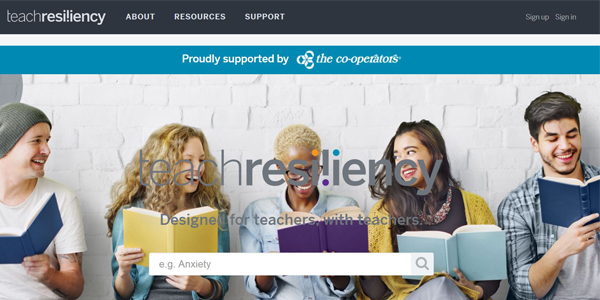Teach Resiliency
Under the leadership of Dr. Susan Rodger (a Psychologist at Western's Faculty of Education and former School Psychologist), a team of educators, mental health leads, researchers and school leaders came together to have conversations about developing resources with teachers. The resources are designed to support educators working with students experiencing mental health challenges, and also to support the mental health and wellness of teachers.  Teach Resiliency is an online resource delivered to educators free-of-charge. Dealing with mental health in the classroom can feel isolating, frustrating, and overwhelming. Teach Resiliency offers an opportunity to access searchable and relevant evidence-based resources and strategies to support mental health at school. Also, Teach Resiliency allows teachers to work and connect with people in the know and gain practical tools to support their journey in the classroom. Teach Resiliency uses language that teachers use when describing behaviour and emotions to search for resources. Teachers often don’t have diagnostic labels for children or youth, but they do know what physical signs they see in the classroom. Therefore, using search terms like “stress” or “fatigue” can be more helpful than the name of a disorder or illness.
Teach Resiliency is an online resource delivered to educators free-of-charge. Dealing with mental health in the classroom can feel isolating, frustrating, and overwhelming. Teach Resiliency offers an opportunity to access searchable and relevant evidence-based resources and strategies to support mental health at school. Also, Teach Resiliency allows teachers to work and connect with people in the know and gain practical tools to support their journey in the classroom. Teach Resiliency uses language that teachers use when describing behaviour and emotions to search for resources. Teachers often don’t have diagnostic labels for children or youth, but they do know what physical signs they see in the classroom. Therefore, using search terms like “stress” or “fatigue” can be more helpful than the name of a disorder or illness.
Dr. Rodger and colleagues, Drs. Alan Leschied and Kathryn Hibbert, have worked with a dedicated team to turn research into evidence-informed resources that are available free-of-charge to educators. The resources are presented in a variety of formats to respond to the information and access needs of teachers. These formats include podcasts, videos, books, and short articles. Users of the site can filter results by media type, age group, and audience and choose the resource that fits their needs at the moment.
Teach Resiliency continues to develop and will soon feature a community of practice component and blog, and the companion site for French-language users will be available in late 2017. TeachResiliency.ca is designed to be innovative, relevant, and responsive to the needs of today’s teachers as they support their own – and their students- mental health and well-being. This project is supported by Physical Health and Education Canada (a national professional teacher association) and works in partnership with CAMH.





